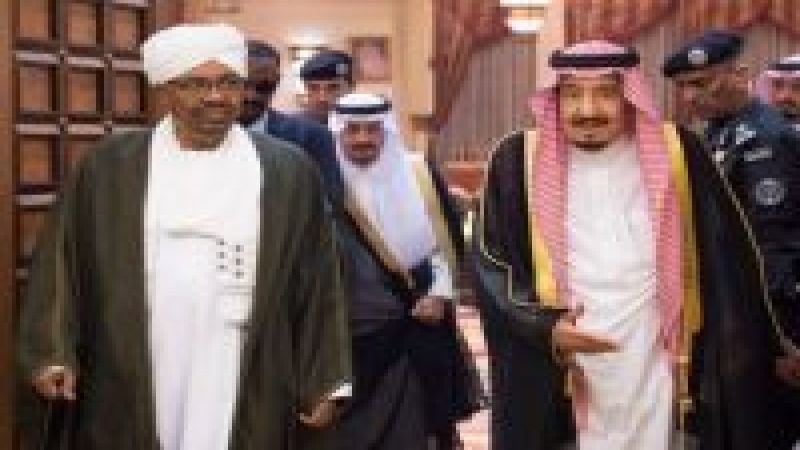
By Patrick Goodenough
Saudi Arabia has not confirmed reports that it has invited Sudanese President Omar al-Bashir to a major Arab-Islamic-U.S. summit to be attended by President Trump in Riyadh next week, although Sudanese opposition figures claim that to be the case.
It would be unprecedented for a prominent Western leader to participate in an event attended by Bashir, who is wanted by the International Criminal Court on charges of war crimes, crimes against humanity and genocide in Darfur.
It also seems highly unlikely that Saudi King Salman would extend an invitation to Bashir – even though the Islamist Sudanese leader is a close ally and supporter of the Saudi military campaign in Yemen – and put the high-profile summit at risk.
Just this past weekend, diplomats from the U.S. and several other Western nations reportedly stayed away from or walked out of a major gathering in Doha, Qatar, to protest Bashir’s participation.
The Saudi and Sudanese embassies in Washington have not responded to queries about Bashir’s reported invitation to the summit in Riyadh.
The kingdom’s official news agency SPA has over recent days issued brief bulletins on Salman’s invitations to 14 Arab and 10 other Islamic leaders. Bashir was not among leaders mentioned in the released bulletins.
But last week Alyoum Altali, a Sudanese newspaper, quoted a presidential spokesman as saying that Bashir had received an invitation from Salman. The Sudan Tribune, a newspaper based outside the country, cited “senior diplomatic sources” as saying he would attend.
An opposition group known as the Sudan’s People Liberation Movement-North (SPLM-N) in a statement then urged U.S. lawmakers and others to protest, saying the prospective participation of Bashir has led to “concern among the victims of genocide and war crimes in Sudan.”
“We appeal to the U.S. administration, the U.S. Congress, the Commission for Religious Freedom in the U.S., the American media, civil societies, religious leaders and human rights activists worldwide to voice their concern, to speak out against the participation of General Bashir in this summit” SPLM-N leader Yasir Arman said in the statement released to Sudan Tribune.
After the ICC issued warrants of arrest for Bashir in 2009 and 2010, human rights advocates expected that his freedom of movement would be severely curtailed, since all signatories of the Rome Statute – the treaty that established the tribunal in The Hague – are obliged to honor arrest warrants issued by the ICC.
Rather than shun Bashir, however, Arab and African leaders in particular have continued to engage with him, and he has traveled widely in those regions. (A 2015 visit to South Africa, a Rome Statute signatory, caused a legal uproar, prompting Pretoria to announce it was withdrawing from the ICC.)
This year alone, Bashir enjoyed a week-long official visit to Saudi Arabia in January, attended an Arab summit in Jordan in March, and paid official visits to Bahrain and Kuwait in April.
He also took part in an African Union summit in Addis Ababa in February, a gathering which passed a non-binding resolution calling on member states to withdraw from the ICC, accusing it of unfairly targeting Africans including Bashir.
This past weekend, Bashir took part in the Doha Forum, a major annual event hosted by the government of Qatar, whose state media also carried reports on meetings on the sidelines between Bashir and Qatar’s emir, Tamim bin Hamad Al-Thani.
Reuters reported that Bashir’s presence prompted the U.S., Australian and Canadian ambassadors to boycott the opening of the forum, and that three European diplomats who did attend said they walked out before Bashir addressed the event.
The ICC was established in 2002 to deal with crimes of genocide, crimes against humanity and other violations, especially in cases where authorities in the countries concerned were unable or unwilling to act.
The United States did not support the initiative, concerned that it would be used to bring politically-motivated cases against Americans, especially U.S. troops operating abroad.
Although the U.S. is not a party to the Rome Statute, it has joined calls for countries that are signatories to cooperate with the tribunal in bringing suspects to trial.
In 2010, for instance, President Obama personally criticized the Kenyan government for allowing Bashir to visit despite being a party to the Rome Statute and thus expected to comply with the ICC arrest warrants.
Leaders invited to attend the Saudi-hosted summit with Trump so far, according to the SPA, are the leaders of Egypt, Oman, Lebanon, Kuwait, Qatar, Algeria, Yemen, UAE, Bahrain, Jordan, Morocco, Iraq, Tunisia and the Palestinian Authority.
Non-Arab leaders invited include the leaders of Malaysia, Indonesia, Pakistan, Turkey, Bangladesh, Turkmenistan, Brunei, Azerbaijan, Niger and Kazakhstan.
Source: cnsnews